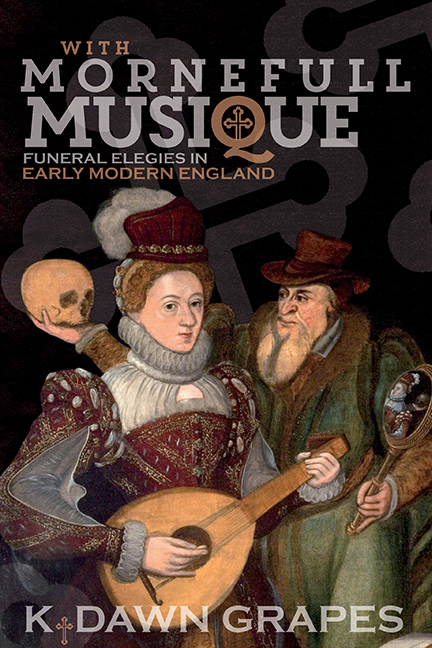 With Mornefull Musique: Funeral Elegies in Early Modern England
With Mornefull Musique: Funeral Elegies in Early Modern England IN the late sixteenth and early seventeenth centuries, England was especially fruitful in its indigenous musical output. One category of secular vocal music that presents an especially well-rounded commentary on the elitist social structure of early modern England is that of musical funerary elegy – songs created in honor of someone who had recently died. During the reigns of Elizabeth I, James I, and Charles I, over sixty extant works were composed that fall into this category. Approximately three-dozen of these musical funeral elegies appear in eighteen collections of music printed and sold between the years 1588 and 1648, often as the final featured work. Two volumes are entirely elegiac. Similar commemorative songs are scattered throughout manuscripts copied during the same era, often reflecting the preferences of the manuscript collector.
Musical elegies have received scholarly attention through the study of individual pieces, usually in connection with a specific composer's complete works or in the context of the collection in which each is found, but much less is written about them as a group. The first published article that collectively considers early English musical commemorations is Vincent Duckles's “The English Musical Elegy of the Late Renaissance,” presented as part of a 1966 Festschrift honoring Gustave Reese. In his essay, Duckles highlights common characteristics and provides commentary on selected works. This foundational study illuminates the importance of musical elegies, invites deeper consideration, and serves as the starting point for this current monograph, which offers fresh perspectives on old music. Here, detailed examination of the texts and music of many of the songs identified by Duckles, as well as additional pieces adhering to the definition of musical funeral elegy, is provided. These compositions have allowed me to tell the stories of the fallen souls who are honored by each song. In doing so, I hope to recognize the humanity of individuals who too often have become one-dimensional in their academic historical contexts.
A close reading of musical funeral elegies also reveals many levels of meaning that may not immediately seem apparent. This group of songs defined by simple classification – secular vocal works written in honor of someone who died – is in fact a complicated genre revealing multiple, complex facets of early modern English society.
To save this book to your Kindle, first ensure no-reply@cambridge.org is added to your Approved Personal Document E-mail List under your Personal Document Settings on the Manage Your Content and Devices page of your Amazon account. Then enter the ‘name’ part of your Kindle email address below. Find out more about saving to your Kindle.
Note you can select to save to either the @free.kindle.com or @kindle.com variations. ‘@free.kindle.com’ emails are free but can only be saved to your device when it is connected to wi-fi. ‘@kindle.com’ emails can be delivered even when you are not connected to wi-fi, but note that service fees apply.
Find out more about the Kindle Personal Document Service.
To save content items to your account, please confirm that you agree to abide by our usage policies. If this is the first time you use this feature, you will be asked to authorise Cambridge Core to connect with your account. Find out more about saving content to Dropbox.
To save content items to your account, please confirm that you agree to abide by our usage policies. If this is the first time you use this feature, you will be asked to authorise Cambridge Core to connect with your account. Find out more about saving content to Google Drive.